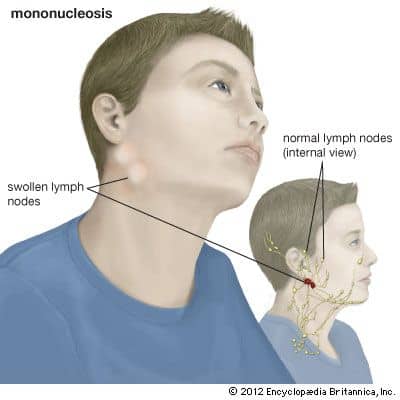Spotting the Signs of Glandular Fever in Children
Hey there, super moms and dads! Are you worried about glandular fever, the sneaky illness that could be bugging your little one? Fear not! We’re here to guide you through the maze of signs and symptoms of this pesky infection, commonly known as the “kissing disease.” So, let’s dive right in and arm ourselves with knowledge to keep our children healthy and happy!
What Is Glandular Fever?
Glandular fever, also known as infectious mononucleosis, is often flagged by the Epstein-Barr virus. Although it can occur at any age, it’s most commonly found among teenagers and young adults. As parents, understanding the ins and outs of this illness can help us navigate our children’s health journey with confidence.
Key Signs of Glandular Fever to Look Out For
Our kids aren’t always great at expressing what’s going on with their health, but certain signs can be a loud and clear indicator that something’s up. Here’s what to keep an eye out for:
- Fever: Does your child have a high temperature that seems to just keep hanging around? This could be a tell-tale sign of glandular fever in the works.
- Sore Throat: An intense sore throat that doesn’t seem to be a straightforward case of tonsillitis might be something more. If it’s glandular fever, the soreness can be severe and stubborn.
- Swollen Lymph Nodes: Feel around your child’s neck – are there any noticeable lumps? Swollen glands, especially around the neck, armpit, and groin, are classic signs of this viral invader.
- Fatigue: Is your energetic kid now a couch potato? An overwhelming sense of tiredness can indicate that the body is fighting off glandular fever.
Other Symptoms That May Accompany Glandular Fever
While fever, sore throat, and swollen lymph nodes are at the top of the watchlist, there are other symptoms that can come into play:
- Headache: Pesky head pains that don’t seem to let up could be linked to glandular fever.
- Skin Rash: Notice a curious rash popping up on your child’s skin? It could possibly be a reaction to antibiotics (if they were prescribed for misdiagnosed strep throat) or a minor symptom of the fever itself.
- Loss of Appetite: If your once-ravenous kiddo is now turning up their nose at meal times, it’s worth noting.
- Muscle Aches: Growing pains? Maybe. But if your child complains of persistent muscle aches, it might be our viral culprit.
While these signs and symptoms can be alarming, it’s important to remember that knowledge is power. Now that you’re equipped with the information on what to look for, you’re one step closer to ensuring your child’s quick recovery. Remember, although glandular fever can mimic other illnesses, these specific signs are your breadcrumbs leading to the right diagnosis.
Stay tuned, wonderful parents, as we’ll delve deeper into understanding glandular fever’s progression, managing your child’s comfort during their recovery, and when to seek medical advice.
Together, we’ll ensure that our children get back to their playful, high-spirited selves in no time. And as always, it’s all about being a vigilant guardian of your child’s health without letting worry cloud the joy of parenting!

5 Things Parents Should Know in Preparing for Glandular Fever Signs
Caring for a child with glandular fever requires patience and preparation. Here are five important things to keep in mind:
- Educate Yourself and Your Family: Understanding the basics of glandular fever helps you spot symptoms early. Share this knowledge with family members and caregivers so they can also recognize the signs.
- Prepare for a Lengthy Recovery: The fatigue caused by glandular fever can last for weeks, or even months. Be ready to adjust schedules and provide ongoing support to your child during their recovery period.
- Keep Hydration and Nutrition in Check: It’s common for appetites to be affected. Have plenty of fluids available and provide nutritious, easy-to-swallow foods if your child has a sore throat.
- Plan for Comfort: Stock up on soothing aids like ice packs, throat lozenges suitable for children, and comfort items like warm blankets to help ease your child’s discomfort.
- Maintain Communication with Your Child’s School: Your child may miss an extended period of schooling. Keep in touch with teachers to manage homework and catch-up plans.
Understanding Glandular Fever’s Progression in Children
Glandular fever can be a bit of a rollercoaster. It often starts with symptoms like a high fever and possibly a sore throat, followed by noticeable swelling of the lymph nodes. After the initial severe symptoms, you might notice that your child enters a period of fluctuating energy levels. Those little bodies are doing their best to fight off the virus, so some days will be better than others.
As the illness progresses, it’s not unusual for symptoms to wax and wane. The key is to keep a steady pace and not push your child back into their normal routine too quickly. This is a time for healing and rest.
Managing Your Child’s Comfort During Recovery
There’s nothing we want more than to take away our child’s discomfort. While we can’t snap our fingers and make it all better, there are several things we can do to help manage their symptoms:
- Encourage bed rest during the initial high-fever phase and allow rest as needed thereafter.
- Provide plenty of fluids to keep them hydrated and help soothe a sore throat.
- Let your child sleep in a comfortable and quiet environment to promote healing sleep.
- Keep them entertained with low-energy activities like reading or watching movies.
These measures can make the recovery process a little more bearable for both you and your child.
When to Seek Medical Advice for Glandular Fever
If you suspect your child has glandular fever based on the symptoms mentioned above, it’s important to consult a healthcare professional. Diagnosis typically involves a clinical examination and may include a blood test to detect specific antibodies.
It’s crucial to seek immediate medical attention if your child experiences:
- Difficulty breathing or swallowing
- Severe abdominal pain
- Intense headaches
- Persistent high fever
These could be signs of complications and require prompt evaluation by a doctor.
Remember that while glandular fever is usually manageable at home, healthcare providers can offer guidance and rule out other potential causes of your child’s symptoms. Moreover, it’s good to keep in mind that antibiotics are not effective against viral infections like glandular fever, so they are not usually prescribed unless a secondary bacterial infection develops.
Armed with the right information and a hefty dose of love and patience, you’ll navigate this challenge like the superhero parent you are! Keep an eye on your child’s symptoms, provide comfort, and stay in communication with healthcare providers. With a little time and care, your child will be back to their usual self, ready to explore the world with renewed vigor and health!
See more great Things to Do with Kids in New Zealand here. For more information see here
Disclaimer
The articles available via our website provide general information only and we strongly urge readers to exercise caution and conduct their own thorough research and fact-checking. The information presented should not be taken as absolute truth, and, to the maximum extent permitted by law, we will not be held liable for any inaccuracies or errors in the content. It is essential for individuals to independently verify and validate the information before making any decisions or taking any actions based on the articles.




